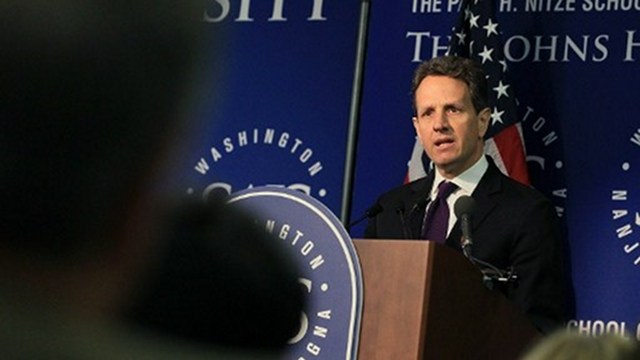SUMMARY
This is AI generated summarization, which may have errors. For context, always refer to the full article.

WASHINGTON, USA – Timothy Geithner left the US Treasury on Friday, January 25, knowing the world’s largest economy, in freefall when he took office 4 years ago, has turned around and returned to the path of growth.
But Geithner, who steps down as treasury secretary, also leaves a massive burden of debt and deficits, the cost of rescuing a imploding financial system that even the best experts did not comprehend at the time.
In saving the banks, 51-year-old Geithner bears the stigma of having used taxpayer money to protect — some critics say reward — the reckless Wall Street behavior that caused the crisis.
From fights inside the White House over who to save, to pressing European counterparts to act, to fending off political attacks, the combative secretary nettled during the rockiest period for finance since the early 1930s collapse.
But, perhaps more than anyone save the Federal Reserve’s Ben Bernanke, he can claim credit for saving the economy.
Named to the treasury by President Barack Obama in January 2009, Geithner designed and oversaw two major bailout packages worth more than $1.5 trillion.
They saved major banks and the US auto industry and helped keep unemployment under 10% as businesses and local governments across the country laid off millions of workers in the first months of his term.
Critics on the right blasted Geithner and Obama for running up the country’s debt to banana republic levels, while from the left they were accused of not pouring nearly enough money into the problem.
Now 51, Geithner came to the job already well-experienced as a senior Treasury bureaucrat in the 1990s.
He was later the head of the New York branch of the Federal Reserve, where in 2008 he oversaw the rescue of Bear Sterns and the collapse of Lehman Brothers as the country plunged into crisis.
When he began as treasury secretary, he recalled in an interview this week with The New Republic: “We were still at the edge of the abyss.
“And we now know in retrospect that the economy was shrinking at an annual rate of 9% and the global economy was in a state of near freefall too. It felt pretty bad,” he told the interviewer.
Four years later, the economy is growing firmly if slowly, and unemployment is down but still uncomfortably high at 7.8%.
The banking sector is financially strong, thanks in part to tough new regulations aimed at preventing any new crisis in which one large bank’s failure can damage the entire system.
The federal budget deficit, which soared to $1.4 trillion as the government spent to reverse the 2008-2009 recession, is back down to below $1 trillion.
And, as the Treasury points out frequently, the government has earned a profit on bailouts, although this is true only if the massive rescue of housing financiers Fannie Mae and Freddie Mac is excluded.
In what almost a summary defense of Geithner’s record in the bailouts, the Treasury told Congress in an end-December report: “By any objective standards, the Troubled Asset Relief Program has worked.
“It helped stop widespread financial panic, it helped prevent what could have been a devastating collapse of our financial system, and it did so at a cost that is far less than what most people expected.”
Geithner, 51, gets much of the credit for that.
But critics say the biggest failing is that Wall Street financiers have not been personally punished for behavior that caused and exploited the crisis, and that many are back making gigantic salaries and taking huge risks as before.
Meanwhile the main victims of the banks, homeowners with mortgages, are still suffering, benefitting only marginally from the bailouts.
Geithner says this was unavoidable.
“To save an economy from a failing financial system, you have to do things that are going to be fundamentally impossible to explain to people,” he told the Washington Post.
“You’re going to look like you’re giving money to people who were responsible for burning down the economy.”
Geithner told interviewers this week that he has “no idea” what he will do next. One thing he won’t do, he told Politico, is to replace Bernanke as chairman of the Fed. “Not a chance,” he said. – Rappler.com
Add a comment
How does this make you feel?
There are no comments yet. Add your comment to start the conversation.